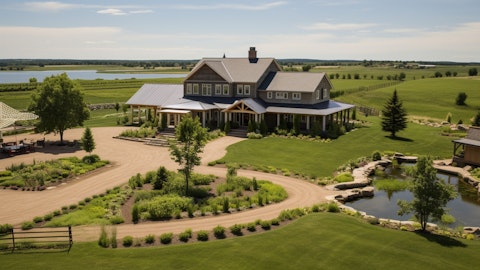California is a unique location in terms of climate and there are high-value crops there that you can grow a few other places in the world and certainly no other places in North America. And so those best firms out there are going to continue to appreciate rapidly. But the more mediocre farms, which we own some of, they’re going to be a little challenged and they are challenged because of water. And then depending on the crop, they’re challenged because of worldwide supply demand characteristics. Walnuts, for example, are in a really tough place on a worldwide supply demand basis. Pistachios and almonds are challenged, but not nearly so much as walnuts. They’re probably going to be okay and recover, although there’s certainly some over planting in those crops.
Citrus on the other hand, is very much a local U.S. market only. We get a lot of citrus in this country from South America, but at a certain harvest window that the U.S. crop becomes available, there’s not much competition. So citrus is, this year, I think going to be a pretty good crop for us and so on and so forth. We, for example, own one vegetable/strawberry farm in California, and that farm is quite profitable, quite successful and will continue to be. So it’s kind of all over the map, but for the general reason of water, we will gradually reduce exposure on that — on the Western U.S. markets sort of think of it as Colorado West. We’ll probably own less over time than we do right now.
John Massocca: I mean, is there a market to sell maybe kind of just a specific crop, California tree-nut farms right now, just given all the kind of stress that particular industry has seen in recent months and years?
Paul Pittman: Yes. I mean there is a market. It’s at a lower price point than it might have been a little while ago. But yes, there’s a market to move properties out there. We are super patient. It is a rare occasion where we will just get rid of something. We think very long-term about our portfolio. And the question isn’t — do you — are you thrilled with the property right now. I mean the management team in general and me, in particular have been doing this a long, long time. It’s — do you think this crop, this particular crop or this particular farm will bounce back in value over the next three to five years? It’s not a question about what’s going to happen in the next 12 months. If we become convinced that a farm is not going to generate long-term value for us, we will let it go.
And I’ll give you two examples. Last year, we sold blueberries in Michigan at a loss, and we sold a small citrus farm in Florida at a loss. We sold everything else last year, pretty much a big gains. But I had and the rest of the management team had given up on Florida citrus and Michigan blueberries. And we’ve given up because we did not believe that there was a meaningful recovery in those farms in the medium term, and it’s just time to take your capital and deploy it somewhere else. We’re not really at that point in anything in California right now. So, hope that helps.
John Massocca: It definitely does. And then I saw that kind of the gross profits for the kind of operated farms went up in expectations for what you can do for the year went up and it was just maybe notable that part of that was a reduction in kind of cost of goods sold. Just can you provide some color on what’s driving that?
Paul Pittman: I’m going to leave that to you, James or you Luca, they’re in the Denver office because it’s fact specific, and I don’t have the facts right in front of me.
James Gilligan: Yes, John, on the cost control change in our outlook, that was mostly caused by kind of revised budgets for spend for the year. In the beginning of the year, some of it was kind of rolled over from prior years and with more time before manager had a chance to kind of sharpen up, if you will. And there’s going to be decreased spend associated with those farms. So that’s what’s causing the change there.
John Massocca: I guess, is there opportunity for maybe more reduction in that line item as there’s more budget clarity? Or is that kind of now more finalized thing as we get kind of closer into the growing season — probably into the growing season, frankly.
James Gilligan: Yes, there’s always small changes available potential, but we think it’s pretty sort of the range of outcome [indiscernible] or converge. So we think it’s narrowing. But there are some little tweaks that can be made later in the year. But for now, we don’t expect any big changes.
John Massocca: Okay. That’s very helpful. And that’s it for me. Thank you.
Operator: That concludes our Q&A session. I will now turn the conference back over to Luca Fabbri for closing remarks.
Luca Fabbri: Thank you, everybody, for your time and your interest in our company and stay tuned for further updates in the quarters to come. Have a great day.
Operator: Ladies and gentlemen, that concludes today’s conference call. Thank you all for joining. You may now disconnect.
Follow Farmland Partners Inc. (NYSE:FPI)
Follow Farmland Partners Inc. (NYSE:FPI)
Receive real-time insider trading and news alerts


